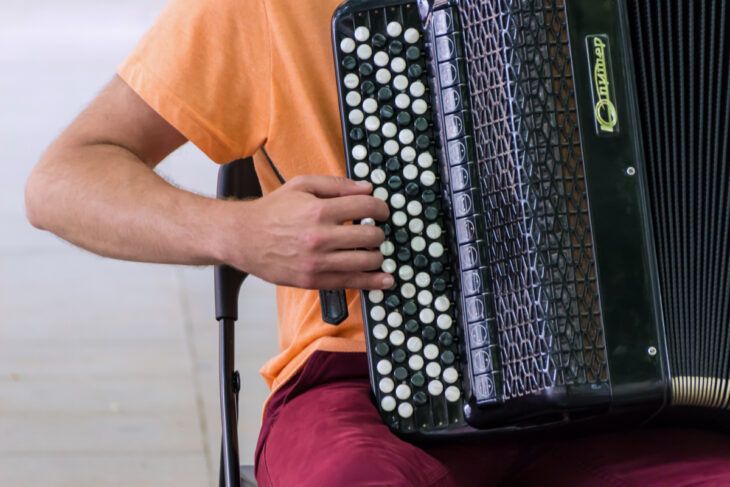Tipping Point
Georgia
- Children
- Disability
- Young people
- Activities

She sits in a chair, rocking violently and does not make
eye contact. On the table beside her there are chime bars,
bongos, tambourine and cymbal, a lyre, and various small percussion
instruments. She looks at these but does not reach out to
play them.
This is Mzia, one of the carers attending training sessions.
She is demonstrating typical behaviour of one of the children
at the school.
The women wanted to try this.
They wanted to show us how it is. There is laughter as
they recognise the behaviour Mzia demonstrates. She looks
brave and vulnerable up there and she also laughs, breaking out of
role for a moment.
It’s the third of the daily
training sessions. Talking about it afterwards, Alastair and
I wonder if there’s a challenge here, as if the women are
starting to say, ‘see how it is for us?’
Mzia plays the bongos in a
scattered, fleeting way, stands up, then slumps back into the
chair, arms folded. Picking up the key we use to tune the
lyre, she taps the cymbal three times, but stops as soon as
Alastair, in the role of therapist, tries to match her
rhythm.
I worry they think that we think
music therapy is some kind of magical cure-all.
Openness and energy characterise our discussions now.
The politeness we experienced in the first few days is being
replaced by honesty, curiosity, and what feels like a real
willingness to experiment with a new way of working.
These women are used to being in a
teaching role, leading and directing what happens. They are
authoritative, clear-voiced and sure. In asking them to be
led by the children, we realise we are asking a lot.
If therapeutic music is to work in
this context, these women have to make it their own, but we also
have ideas and opinions. It is tricky to get the balance
right between sounding like we know something, and recognising what
is already known here. We want to draw on skills and
strengths the women already have in communicating and building
relationships with children. But therapy is a different
shaped container from the classroom. Its relationships are
based on eliciting responses from children rather than requiring
them.
Some of the sessions feel chaotic.
We are also finding our feet and getting to know the
children, learning to stay grounded and hold a sense of the group,
and drawing children into the music. In training sessions, we
all agree that you can’t force anyone to do anything.
But there is a lot of discussion about how much we should
encourage participation, how much simply make the space and wait.
One day, Alastair talks about the parallels between music
therapy and early mother-child interaction. He talks about
the importance of staying still, so that children feel safe to
explore, knowing they can come back. Somehow, even before the
translation comes, it’s clear that the women understand this.
There is a focusing, a drawing in, and quiet. There are
nods, bodies alert in chairs.
These moments, when they come, are electric.
We are now half way through the project. There is some
kind of tipping point and we have moved imperceptibly from thinking
about beginnings to thinking about endings. Things are
speeding up. It reminds me of the moment when summer becomes
autumn and you just know it, even though you can’t say
why.
In Tbilisi, the wind has stopped
blowing and now it is getting cold. The ocean drum got fixed
with sellotape, and Alastair has had his fishing trip. At the
weekend, I took a mashrutka north to Kazbegi, where snow lies on
the high ground, red apples cling to wintery branches and cows and
chickens – and a few waterproofed tourists – wander in
the streets.
As time goes on, there is a
lot of energy around some of the ideas we discuss in training
sessions. The women talk backwards and forwards, not leaving
space for Darina to translate. Alastair and I end up frowning
at each other, wondering when to jump in. We are still at the
‘where’s the post office’ stage of things with
our Georgian and trying to work in two languages makes things
complicated at times. It also puts a lot of pressure on
Darina.
In sessions with children, though,
our lack of Georgian can be helpful. Apart from the simplest
words and phrases, everything takes place in the music and in
gesture. This means everything is available to everyone.
It makes me realise how much of verbal communication is
unnecessary, how words can get in the way of what is trying to
happen (a strange thing to write in the middle of this wordy
blog!).
Staff members are beginning to put
their teaching roles to one side, working to create a space where
the children feel safe to explore in their own ways. In
parallel to this, we now spend much of the time in training
sessions role-playing specific situations and watching video
extracts from the work with children. This allows the women
to see and feel for themselves what works.
Knowing how time goes, I know that
any moment now we will be in a car on the way to the airport.
Time is short. We are already talking about what
happens next, and how we can develop the project.
Staff and children at the school
are doing amazing things and we are both learning a lot from
working here. We hope the energy and enthusiasm to continue
the work will continue to grow after we leave, and we have some
ideas about how to support this.
Very happy to be here! Many
thanks for help with fundraising, donations of instruments and all
your support!
Related projects
-
On-site skill-sharing: Public School No.200 (Tbilisi) 2011
Georgia
- Children
- Disability
- Young people
